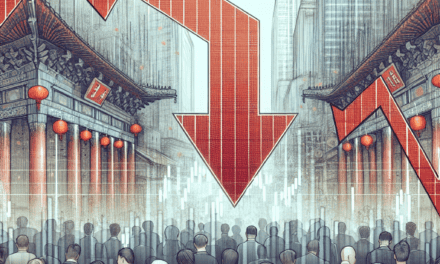“DJT Stock Skyrockets: Controversy Fuels Market Momentum Ahead of Election”
Introduction
DJT stock experienced a significant surge following former President Donald Trump’s controversial rally at Madison Square Garden, which took place in the lead-up to the upcoming election. The event, marked by fervent support and widespread media attention, has seemingly bolstered investor confidence in companies associated with Trump’s brand and political influence. As the rally drew both criticism and praise, the market’s reaction underscores the complex interplay between political events and financial markets, highlighting how Trump’s continued presence in the political arena can impact stock performance.
Impact Of Political Rallies On Stock Market Trends
The intersection of politics and the stock market is a complex and often unpredictable domain, where investor sentiment can be swayed by political events and figures. Recently, the stock market witnessed a significant movement following a controversial rally held by former President Donald Trump at Madison Square Garden (MSG). This event, occurring in the lead-up to the upcoming election, has sparked considerable debate among investors and analysts alike, particularly concerning its impact on DJT stock, which saw a notable surge in value.
Political rallies, especially those involving high-profile figures like Donald Trump, have the potential to influence market trends in various ways. Investors often react to the perceived implications of political events on economic policies, regulatory environments, and overall market stability. In this context, Trump’s rally at MSG served as a catalyst for heightened investor interest in DJT stock, a company closely associated with the former president. The rally’s controversial nature, characterized by polarizing rhetoric and fervent support from attendees, further amplified its impact on market dynamics.
One of the primary reasons for the surge in DJT stock can be attributed to the rally’s emphasis on economic growth and deregulation, themes that resonate with many investors. Trump’s speeches often highlight his administration’s past achievements in these areas, creating a sense of optimism among his supporters regarding potential future policies. This optimism can translate into increased investor confidence, driving up stock prices as market participants anticipate favorable conditions for businesses linked to Trump’s political agenda.
Moreover, the rally’s timing, strategically positioned ahead of the election, added another layer of complexity to the stock market’s response. As election day approaches, investors are keenly aware of the potential shifts in political power and their subsequent impact on the economy. Trump’s rally, therefore, not only reinforced his presence in the political arena but also served as a reminder of the possible return to policies that some investors view as beneficial for business growth. This anticipation can lead to speculative trading, further contributing to the volatility observed in DJT stock.
However, it is essential to recognize that the relationship between political rallies and stock market trends is not always straightforward. While some investors may view Trump’s rally as a positive signal, others may perceive it as a source of uncertainty, particularly given the divisive nature of his political style. This divergence in investor sentiment can result in fluctuating stock prices, as market participants weigh the potential risks and rewards associated with political developments.
In addition to investor sentiment, external factors such as media coverage and public perception also play a crucial role in shaping market trends. The extensive media attention surrounding Trump’s MSG rally, coupled with the public’s varied reactions, can influence investor behavior by shaping the narrative around DJT stock. Positive media coverage may bolster investor confidence, while negative reports could lead to caution and hesitancy in the market.
In conclusion, the impact of political rallies on stock market trends is a multifaceted phenomenon, influenced by a myriad of factors ranging from investor sentiment to media coverage. The recent surge in DJT stock following Donald Trump’s controversial MSG rally underscores the intricate relationship between politics and the financial markets. As the election approaches, investors will continue to monitor political events closely, seeking to navigate the complexities of a market environment shaped by both economic fundamentals and political dynamics.
Analyzing DJT Stock Performance Post-MSG Rally
The recent surge in DJT stock has captured the attention of investors and political analysts alike, following Donald Trump’s controversial rally at Madison Square Garden (MSG). This event, held ahead of the upcoming election, has sparked a myriad of discussions regarding its impact on the stock market, particularly concerning DJT, a company closely associated with the former president. To understand the dynamics at play, it is essential to examine the factors contributing to this stock’s performance and the broader implications for investors.
Initially, the rally at MSG was marked by a significant turnout, with supporters and critics alike gathering to witness Trump’s address. The event was characterized by its polarizing rhetoric, which, while controversial, succeeded in galvanizing a substantial portion of his base. This fervor translated into increased investor confidence in DJT, as the company is often perceived as a barometer for Trump’s political influence and public support. Consequently, the stock experienced a notable uptick in value, reflecting the market’s reaction to the rally’s perceived success.
Moreover, the rally’s timing, strategically positioned ahead of the election, played a crucial role in influencing DJT’s stock performance. Investors are acutely aware of the potential policy shifts and economic implications that could arise from a Trump victory. As such, the rally served as a litmus test for his electoral prospects, with a strong showing bolstering confidence in DJT’s future profitability. This anticipation of favorable political outcomes has historically driven stock prices, and the MSG rally was no exception.
In addition to the political undertones, the rally also highlighted Trump’s continued influence over certain sectors of the economy. His emphasis on deregulation and tax cuts during the speech resonated with investors who anticipate that such policies could benefit DJT and similar companies. This alignment of political and economic interests further fueled the stock’s ascent, as market participants speculated on the potential for enhanced corporate earnings under a Trump administration.
However, it is important to consider the inherent risks associated with investing in DJT, given its close ties to Trump’s political fortunes. The stock’s volatility is often exacerbated by the unpredictable nature of political events and public sentiment. While the MSG rally provided a temporary boost, investors must remain vigilant to the possibility of sudden downturns, particularly if Trump’s political standing were to wane. This underscores the need for a cautious approach, balancing optimism with an awareness of the potential for rapid market shifts.
Furthermore, the broader market context cannot be ignored when analyzing DJT’s performance. The rally occurred amidst a backdrop of economic uncertainty, with inflationary pressures and geopolitical tensions influencing investor behavior. These factors, coupled with the rally’s immediate impact, contributed to a complex market environment where DJT’s stock movements were both a reflection of and a reaction to these external variables.
In conclusion, the MSG rally served as a catalyst for DJT’s stock surge, driven by a confluence of political enthusiasm and economic speculation. While the event underscored Trump’s enduring influence, it also highlighted the inherent volatility associated with stocks linked to political figures. As investors navigate this landscape, they must weigh the potential rewards against the risks, remaining attuned to the evolving political and economic climate that continues to shape DJT’s trajectory.
The Role Of Controversy In Stock Market Volatility
The intersection of politics and the stock market has always been a subject of intrigue and speculation. Recently, this dynamic was vividly illustrated when DJT stock experienced a significant surge following Donald Trump’s controversial rally at Madison Square Garden (MSG) ahead of the upcoming election. This event underscores the complex relationship between political controversy and stock market volatility, highlighting how investor sentiment can be swayed by political events.
To begin with, it is essential to understand the context in which DJT stock operates. As a company closely associated with Donald Trump, its stock performance is often influenced by his public appearances and political maneuvers. The rally at MSG, marked by its contentious rhetoric and polarizing themes, captured widespread media attention, thereby impacting investor perceptions. In the world of finance, perception often drives reality, and the stock market is no exception. Investors, anticipating potential policy shifts or changes in public sentiment, may react swiftly to political events, leading to fluctuations in stock prices.
Moreover, the rally’s timing, occurring just before a major election, added another layer of complexity to the situation. Elections inherently bring uncertainty, and markets typically respond to uncertainty with volatility. In this case, the rally’s controversial nature may have amplified investor reactions, as stakeholders attempted to gauge the potential implications of Trump’s political strategies on the broader economic landscape. This scenario exemplifies how political events can serve as catalysts for market movements, with controversy acting as a magnifying glass that intensifies investor focus and reaction.
Furthermore, the rally’s impact on DJT stock can be attributed to the broader phenomenon of media influence on market behavior. In today’s digital age, information spreads rapidly, and media coverage can significantly shape public opinion and investor sentiment. The extensive coverage of Trump’s MSG rally, with its emphasis on controversial statements and themes, likely contributed to heightened investor interest and activity. This media-driven attention can create a feedback loop, where increased coverage leads to greater market activity, which in turn generates more media interest.
In addition to media influence, the psychological aspect of investing plays a crucial role in understanding stock market volatility in the face of controversy. Behavioral finance suggests that investors are not always rational actors; emotions and cognitive biases often drive decision-making processes. The polarizing nature of Trump’s rally may have triggered emotional responses among investors, leading to impulsive buying or selling decisions. This emotional volatility can exacerbate market fluctuations, as investors react not only to the content of political events but also to their own perceptions and biases.
In conclusion, the surge in DJT stock following Donald Trump’s controversial MSG rally serves as a compelling case study of the role of controversy in stock market volatility. The interplay between political events, media influence, and investor psychology creates a complex environment where stock prices can be significantly affected by factors beyond traditional financial metrics. As the election approaches, it is likely that similar instances of political controversy will continue to impact market behavior, underscoring the need for investors to remain vigilant and informed. Understanding the multifaceted relationship between politics and the stock market is crucial for navigating the uncertainties that lie ahead.
Investor Reactions To Political Events: A Case Study
In the ever-evolving landscape of financial markets, the intersection of politics and stock performance often presents a fascinating case study for investors. The recent surge in DJT stock following Donald Trump’s controversial rally at Madison Square Garden (MSG) ahead of the upcoming election serves as a compelling example of how political events can significantly influence investor sentiment and market dynamics. This phenomenon underscores the intricate relationship between political developments and financial markets, highlighting the need for investors to remain vigilant and informed.
To begin with, it is essential to understand the context in which DJT stock experienced a notable increase. Donald Trump’s rally at MSG, characterized by its polarizing rhetoric and substantial media coverage, captured the attention of both supporters and critics. The event, while controversial, succeeded in galvanizing a significant portion of the electorate, thereby impacting market perceptions. Investors, keenly aware of the potential implications of Trump’s political maneuvers, responded by adjusting their portfolios, leading to a surge in DJT stock.
Moreover, the rally’s timing, strategically positioned ahead of the election, played a crucial role in shaping investor reactions. As the election looms, market participants are increasingly attuned to political developments that could influence policy directions and economic conditions. Trump’s rally, with its emphasis on economic growth and deregulation, resonated with investors who anticipate favorable business conditions under his potential leadership. Consequently, the rally’s impact on DJT stock can be attributed to a combination of political messaging and market expectations.
In addition to the rally’s immediate effects, it is important to consider the broader implications of political events on investor behavior. Historically, political rallies and speeches have served as catalysts for market volatility, as investors seek to interpret the potential outcomes of electoral processes. In this case, Trump’s rally not only influenced DJT stock but also prompted a reevaluation of risk and opportunity across various sectors. Investors, driven by both optimism and caution, adjusted their strategies to align with the perceived political landscape.
Furthermore, the rally’s impact on DJT stock highlights the role of media coverage in shaping investor perceptions. The extensive media attention surrounding the event amplified its significance, reaching a wide audience and influencing public opinion. As a result, investors were not only reacting to the content of Trump’s speech but also to the broader narrative constructed by media outlets. This interplay between media coverage and investor sentiment underscores the complexity of market reactions to political events, where perception often plays as significant a role as reality.
In conclusion, the surge in DJT stock following Donald Trump’s controversial MSG rally ahead of the election serves as a poignant reminder of the intricate relationship between politics and financial markets. As investors navigate the complexities of political events, they must remain attuned to the multifaceted factors that influence market dynamics. The case of DJT stock illustrates how political messaging, media coverage, and market expectations converge to shape investor behavior. Ultimately, this case study underscores the importance of informed decision-making in an environment where political developments can have profound implications for financial markets. As the election approaches, investors will undoubtedly continue to monitor political events closely, seeking to anticipate their potential impact on market performance.
Election Year Stock Market Dynamics: DJT As A Case
In the ever-volatile landscape of election year stock market dynamics, the recent surge in DJT stock following Donald Trump’s controversial rally at Madison Square Garden has captured the attention of investors and political analysts alike. This unexpected rise in stock value underscores the intricate relationship between political events and market behavior, particularly during an election year when uncertainty often reigns supreme. As the nation braces for the upcoming election, the financial markets are closely monitoring every move made by key political figures, with Trump’s rally serving as a prime example of how political actions can reverberate through the stock market.
The rally, held at the iconic Madison Square Garden, was marked by a series of bold statements and policy promises that resonated with a significant portion of the electorate. Despite the controversy surrounding some of his remarks, the event succeeded in energizing his base, which in turn had a ripple effect on the stock market. Investors, always keen to anticipate the potential outcomes of political developments, responded swiftly to the rally’s implications. The DJT stock, which had been experiencing a period of stagnation, suddenly found itself on an upward trajectory, reflecting renewed investor confidence in Trump’s political prospects.
This phenomenon is not entirely unprecedented. Historically, election years have been characterized by heightened market sensitivity to political events. Investors often adjust their portfolios based on perceived shifts in policy direction, regulatory changes, and economic forecasts associated with different candidates. In this context, Trump’s rally served as a catalyst for market speculation, prompting investors to reassess their positions in light of the potential impact of his policies on various sectors. The rally’s focus on economic growth, deregulation, and tax reforms resonated with investors who view these policies as conducive to a favorable business environment.
Moreover, the rally’s timing played a crucial role in amplifying its impact on the stock market. With the election drawing closer, market participants are increasingly attuned to any signals that might indicate the future political landscape. Trump’s ability to galvanize his supporters and articulate a clear economic vision provided a sense of direction that investors found reassuring. This sense of clarity, albeit controversial, offered a counterbalance to the uncertainty that typically characterizes election years, thereby contributing to the surge in DJT stock.
However, it is important to note that the stock market’s reaction to political events is not always straightforward. While Trump’s rally may have bolstered DJT stock in the short term, the long-term implications remain uncertain. Investors must navigate a complex web of factors, including potential policy shifts, geopolitical tensions, and economic indicators, all of which can influence market dynamics. As such, while the rally provided a temporary boost, the sustainability of this upward trend will depend on a multitude of variables that extend beyond the immediate political landscape.
In conclusion, the rise in DJT stock following Donald Trump’s controversial rally at Madison Square Garden highlights the intricate interplay between political events and market behavior during an election year. As investors continue to grapple with the uncertainties inherent in the political process, events such as this rally serve as pivotal moments that can sway market sentiment. While the immediate impact on DJT stock has been positive, the broader implications for the stock market will unfold as the election approaches, underscoring the need for investors to remain vigilant and adaptable in the face of evolving political dynamics.
The Influence Of Political Figures On Market Confidence
The influence of political figures on market confidence is a phenomenon that has long intrigued economists and investors alike. Recently, this dynamic was vividly illustrated when DJT stock experienced a significant surge following Donald Trump’s controversial rally at Madison Square Garden. As the former president took the stage, his presence not only electrified his supporters but also sent ripples through the financial markets, highlighting the intricate relationship between political events and investor sentiment.
To understand this phenomenon, it is essential to consider the broader context in which political figures operate. Political leaders, especially those with a substantial following, can profoundly impact market confidence through their policies, rhetoric, and public appearances. In the case of Donald Trump, his influence on the market is well-documented, dating back to his tenure as president. His policies, particularly those related to tax cuts and deregulation, were often credited with boosting investor confidence and driving stock market gains.
The recent rally at Madison Square Garden served as a reminder of Trump’s enduring influence. Despite the controversy surrounding the event, which included protests and widespread media coverage, the rally managed to capture the attention of both his supporters and the financial markets. Investors, always keen to anticipate the potential impact of political developments, reacted swiftly. The surge in DJT stock can be attributed to several factors, including the perception that Trump’s policies, if re-implemented, could favor certain sectors of the economy.
Moreover, the rally underscored the importance of political narratives in shaping market expectations. Trump’s speeches often emphasize themes of economic growth, job creation, and national strength, which resonate with investors seeking stability and prosperity. By projecting confidence and a clear vision for the future, political figures like Trump can instill a sense of optimism among investors, leading to increased market activity and stock price fluctuations.
However, it is crucial to recognize that the influence of political figures on market confidence is not always straightforward. While some investors may view Trump’s rally as a positive signal, others may perceive it as a source of uncertainty, particularly given the polarizing nature of his political career. This duality highlights the complexity of market psychology, where investor sentiment can be swayed by both positive and negative perceptions of political events.
Furthermore, the impact of political figures on market confidence extends beyond immediate stock price movements. Long-term investor sentiment is often shaped by the policies and decisions enacted by political leaders. As such, the anticipation of potential policy changes following an election can lead to strategic shifts in investment portfolios. In this context, Trump’s rally at Madison Square Garden serves as a catalyst for investors to reassess their positions and consider the implications of a potential return to his policy agenda.
In conclusion, the recent surge in DJT stock following Donald Trump’s controversial rally at Madison Square Garden exemplifies the profound influence political figures can have on market confidence. By understanding the interplay between political events and investor sentiment, one can gain valuable insights into the mechanisms that drive financial markets. As the election approaches, the actions and rhetoric of political leaders will undoubtedly continue to shape market dynamics, underscoring the importance of staying informed and adaptable in an ever-evolving economic landscape.
Predicting Stock Movements In Politically Charged Environments
In the ever-evolving landscape of stock markets, political events often serve as catalysts for significant fluctuations. The recent surge in DJT stock following Donald Trump’s controversial rally at Madison Square Garden exemplifies this phenomenon. As the former president took the stage ahead of the upcoming election, investors and analysts alike were keenly observing the potential implications for the stock market. This rally, marked by fervent support and equally intense opposition, underscored the intricate relationship between political climates and market dynamics.
To understand the impact of such events on stock movements, it is essential to consider the broader context in which they occur. Political rallies, especially those involving high-profile figures like Donald Trump, can influence investor sentiment in profound ways. The anticipation of policy changes, regulatory shifts, or economic strategies often leads to speculative trading, as market participants attempt to position themselves advantageously. In this case, Trump’s rally was not just a political event but a signal to investors about potential future directions in economic policy and governance.
Moreover, the rally’s controversial nature added another layer of complexity to the market’s response. Controversy tends to amplify uncertainty, a key driver of market volatility. Investors, wary of potential disruptions or shifts in the political landscape, may react by adjusting their portfolios, either by divesting from perceived risks or by capitalizing on anticipated opportunities. The DJT stock, closely associated with Trump’s business ventures and political influence, became a focal point for such speculative activity.
Transitioning from the immediate effects of the rally, it is crucial to examine the longer-term implications for stock movements in politically charged environments. Historically, markets have shown a tendency to react to political events with short-term volatility, followed by a period of stabilization as the initial shock subsides. However, the current political climate, characterized by heightened polarization and rapid information dissemination, may prolong these periods of volatility. Investors must therefore remain vigilant, continuously assessing the evolving political landscape and its potential impact on market conditions.
Furthermore, the role of media coverage in shaping investor perceptions cannot be overlooked. In today’s digital age, information spreads rapidly, often influencing market behavior before official announcements or policy changes occur. The extensive media coverage of Trump’s rally, with its focus on both the content of his speech and the reactions it elicited, likely contributed to the heightened activity surrounding DJT stock. Investors, bombarded with real-time updates and analyses, must navigate this information deluge to make informed decisions.
In conclusion, predicting stock movements in politically charged environments requires a nuanced understanding of the interplay between political events, investor sentiment, and market dynamics. The recent surge in DJT stock following Donald Trump’s controversial rally at Madison Square Garden serves as a reminder of the profound impact political figures and events can have on financial markets. As the election approaches, investors must remain attuned to the political landscape, recognizing that while short-term volatility is inevitable, strategic positioning and informed decision-making can mitigate risks and capitalize on opportunities. In this complex environment, the ability to anticipate and adapt to political developments will be crucial for navigating the uncertainties of the stock market.
Q&A
1. **What caused DJT stock to soar?**
The stock surged following Donald Trump’s controversial rally at Madison Square Garden, which generated significant media attention and investor interest.
2. **When did the MSG rally take place?**
The rally occurred ahead of the upcoming election, though the exact date is not specified.
3. **Why was the rally considered controversial?**
The rally was deemed controversial due to Trump’s polarizing statements and the charged political atmosphere surrounding the event.
4. **How did investors react to the rally?**
Investors reacted positively, driving up the stock price due to increased visibility and potential political influence.
5. **What impact did the rally have on the election?**
The rally potentially swayed public opinion and energized Trump’s supporter base, though its direct impact on the election outcome is uncertain.
6. **What is the significance of the rally’s location at MSG?**
Hosting the rally at Madison Square Garden, a high-profile venue, amplified its visibility and media coverage.
7. **What are analysts saying about the stock’s future?**
Analysts are divided, with some predicting continued volatility due to political factors, while others see potential growth opportunities.
Conclusion
The surge in DJT stock following Donald Trump’s controversial rally at Madison Square Garden highlights the complex interplay between political events and market reactions. The rally, which drew significant media attention and public discourse, appears to have bolstered investor confidence in companies associated with Trump’s brand or political influence. This market response underscores the potential for political figures to impact stock performance, particularly when their actions resonate with or polarize public opinion. As the election approaches, such events may continue to influence market dynamics, reflecting broader investor sentiment and expectations regarding political outcomes.





